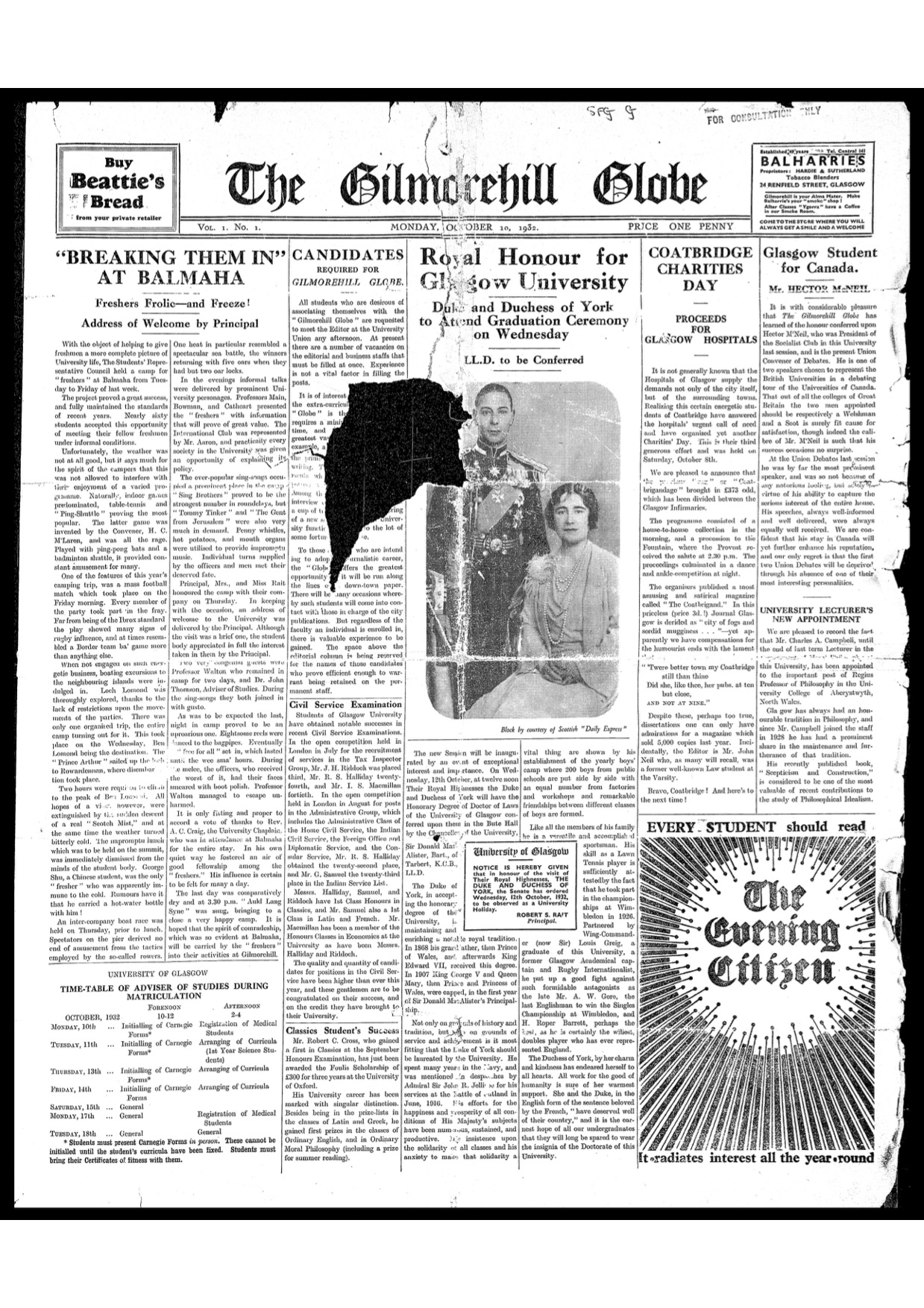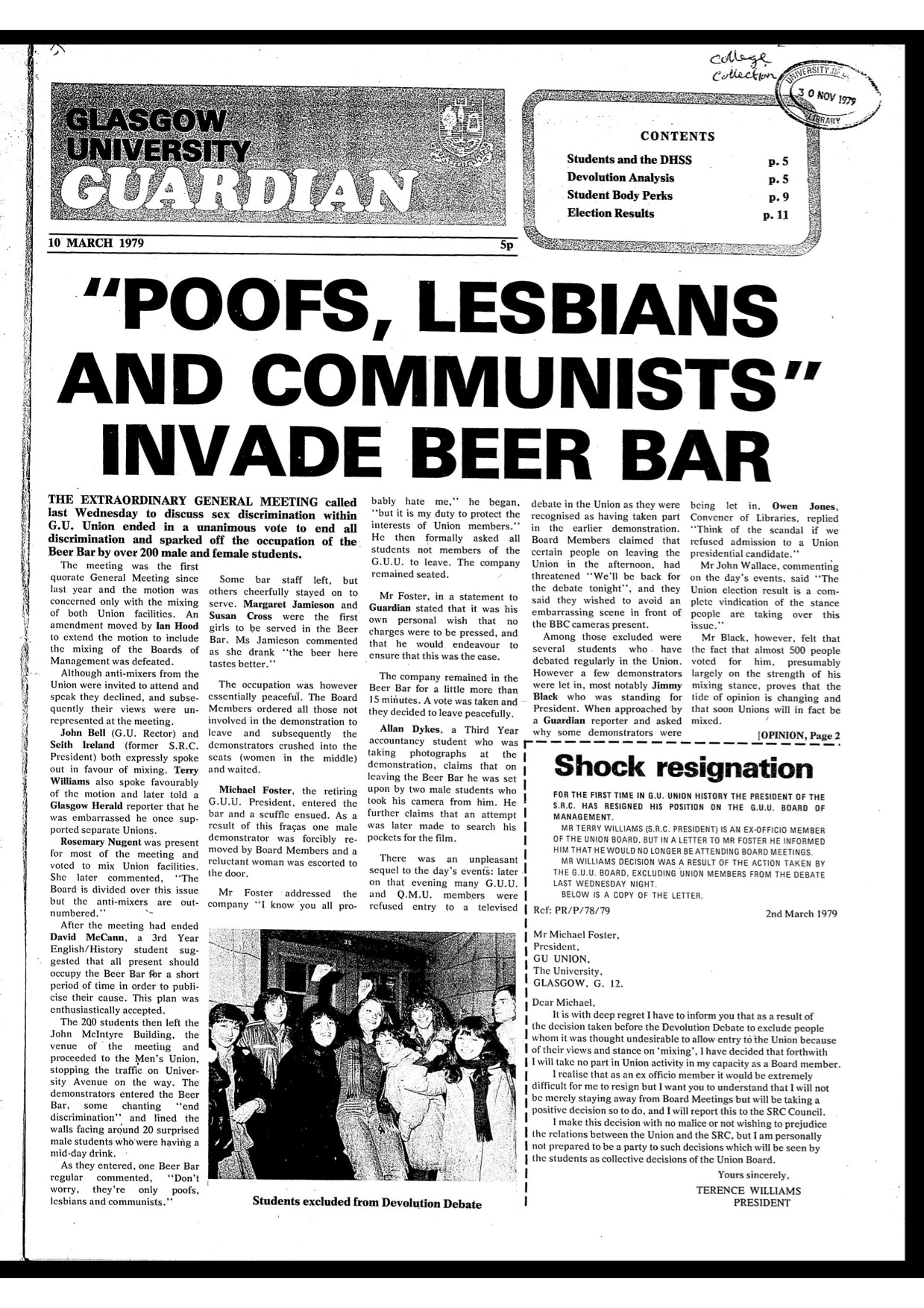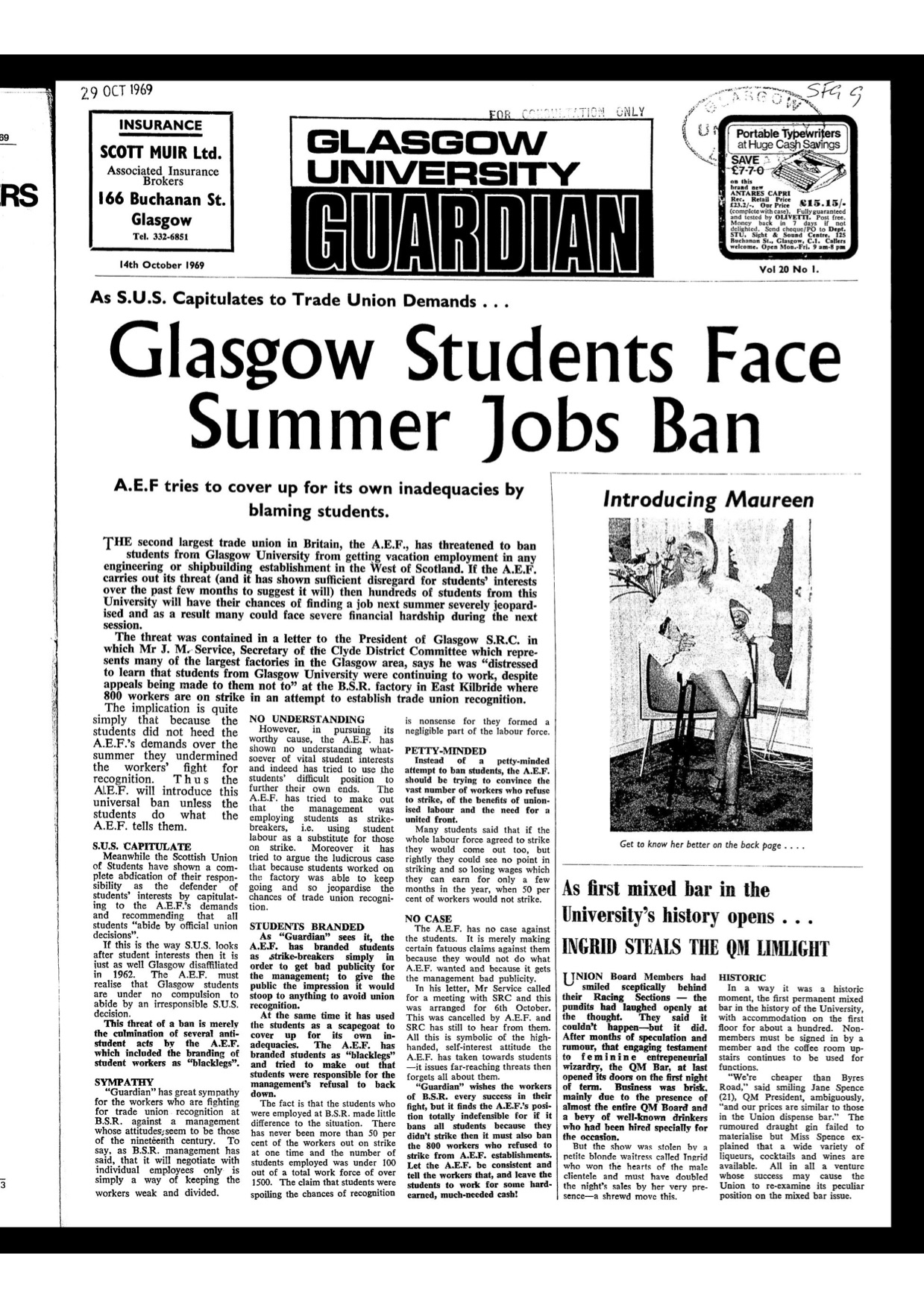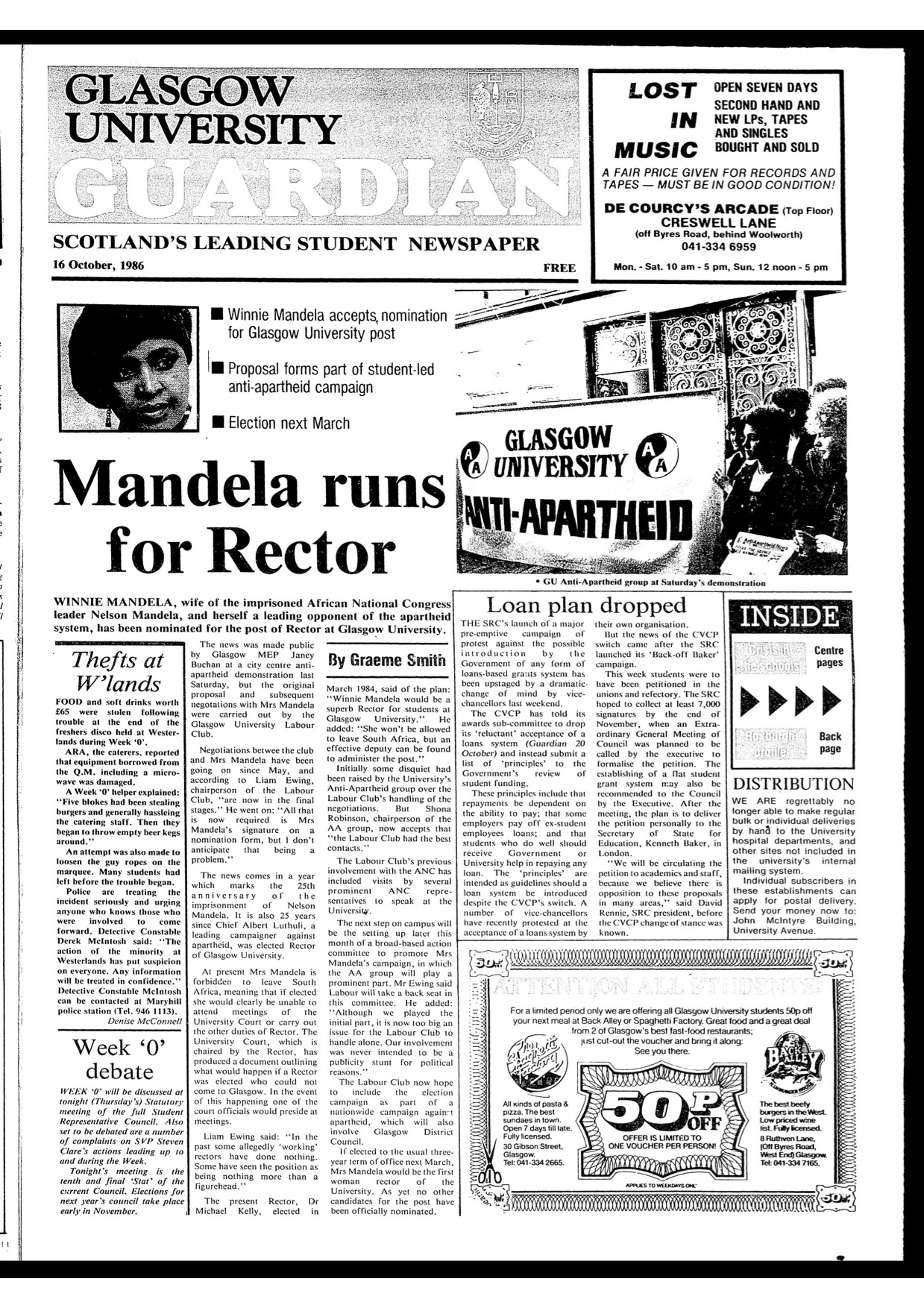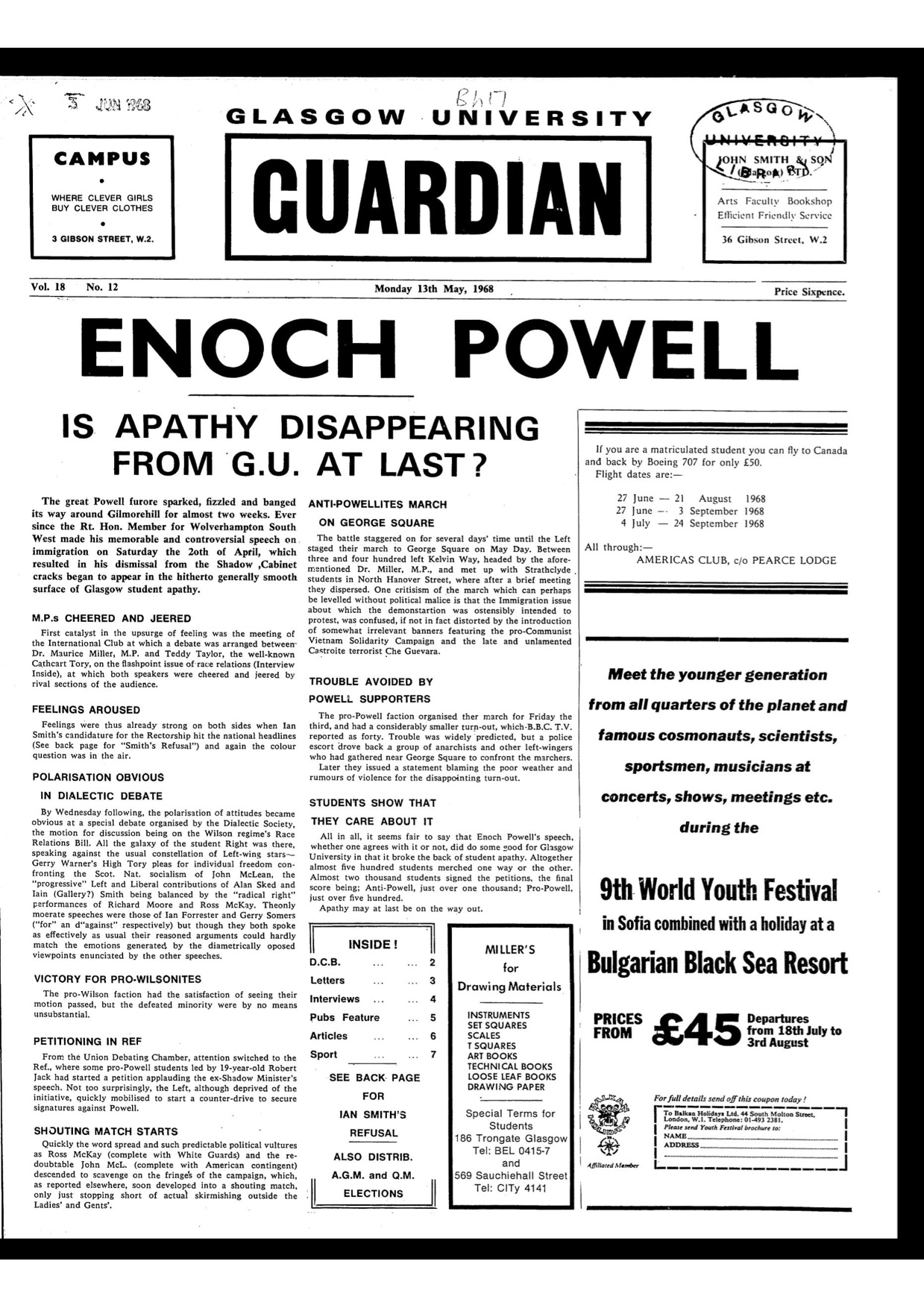Features Editors
“All students who are desirous of associating themselves with The ‘Gilmorehill Globe’ are requested to meet the editor at the University Union any afternoon. […] Experience is not a vital factor in filling the posts.” – Thus read the very first and now familiar call for Glasgow Guardian “contribs”. In this respect (essentially an appeal to complete amateurs to pick up the pen) very little has changed since six well-heeled young men and one woman launched the “Gilmorehill Globe”, as it was then known, at the beginning of the academic year of 1932. A transitional time for sure, the students paying one penny for that issue must have felt the thrust of the changing world around them; growing up through an uncertain decade in the wake of a traumatic war, these young men and women would live on to see a yet greater bloodbath, the deepening of the Great Depression, alongside the end of Britain as a country of empire, and Glasgow as a city of industrial might. It is chilling to think that less than half a year after issue one hit the newsstands, a small man with an even smaller moustache would address baying thousands as the new Chancellor of Germany.
Considering the mass of history since that year, one quickly appreciates the immense privilege of having access to what is certainly the most complete set of archives of any British student paper. As we scoured these, on the eve of our 85th birthday, in order to put together this special retrospective piece, we’ve become firmly convinced that, as students, it is surely a memorable experience to view such a turbulent century as it was witnessed, and reported on, by people like us. However much student demographics may have changed from the days of mid-century exclusivity, our student paper has always been an organ of inquisitive young amateurs, transcribing the world for the first time – just as it is today. Many of these amateurs have went on to become anything but; Andrew Neil and Fraser Nelson both work at the highest level of journalism, Donald Dewar took the helm at the onset of a new era in Scottish history, and William Boyd has collected awards and acclaim for his fiction. If we’ve done our job right, what follows should be an amusing and eye-opening tour through great events, changing attitudes and Maureen (get to know her better on the back page).
The sixties, that decade of noted student unrest from Berkeley to the Sorbonne, seemed like an excellent place to start. One issue in the febrile year of 1968 (which disappointingly revealed nothing like the events in Paris that year) reported the effect that had been made on campus by Enoch Powell’s infamous “Rivers of Blood” speech. Powell famously seethed: “We must be mad, literally mad, as a nation to be permitting the annual inflow of some 50,000 dependants… It is like watching a nation busily engaged in heaping up its own funeral pyre” – and Glasgow students came out in force, both for and against. The Guardian reported then “Cracks in the hitherto generally smooth surface of Glasgow student apathy”; it became clear we were a little more set in our ways than those upturning cars on the streets of Paris.
Indeed, the paper would have fooled no one as progressive when, a year later, the front page offered up “Maureen”, a smiling pin-up girl, promising readers the chance to “get to know her better on the back page”. Although striking a pose that would scarcely clear “suggestive” today, Maureen no doubt set the heart of many a libidinous young student racing. “With compliments of the editor” read the caption, that editor being none other than Andrew Neil himself. Sordid stuff.
The March of 1979 saw the GUU finally decide to mix genders. In a historic general meeting there was a unanimous vote in favour of mixing both unions, although an amendment to include in the vote the mixing of boards of management was defeated. After the vote, a throng of some 200 students marched down to the GUU, and Margaret Jamieson, one of the two women to first experience the union quipped, “the beer here tastes better”, and nothing has changed since. Though, as you might expect, not all were overjoyed at the prospect of a male and female union. The Guardian reported that some bar staff walked out and one drinker already in the beer bar charmingly quipped “don’t worry, they’re only poofs, lesbians, and communists”, thus supplying the memorable headline. In addition, two students were forcibly removed after a confrontation occurred following the appearance of the then GUU President. As a result of the action taken by students on that day, the SRC President resigned his position on the GUU board of management, citing specifically the issue of mixing in the unions. Positive change can be a bitter pill.
Readers may remember our rector elections this year. They have often been a cause for hot debate on campus, then as now. Academic year 1986/87 saw Winnie Mandela take the helm as rector of Glasgow University, six months after her nomination. Despite the neat 25 years since her husband’s imprisonment, and her being an extremely well-known individual in her own right, the turnout for student elections that year were even lower than this year’s display. In 1987, less than 25% turned out; in 2017, 31% of all students cast their vote. The “generally smooth surface of Glasgow student apathy” once more. Mandela, however, did command a large portion of the vote, taking over half of the 1350 votes cast. Forbidden from leaving South Africa, she sent on her behalf Amanda Kwadi, a recipient of the Nelson Mandela Scholarship at the London School of Economics. Ms Kwadi had herself been incarcerated by the South African government and gave a speech that had been sent via Telex by Mandela only half an hour before the installation. Some three years later, Nelson Mandela would walk free and apartheid would be over within the year.
The Guardian perhaps reached its apogee as an investigative force in 2004 with a unique intersection with the world of Cold War espionage. “The spy who lectured me…” revealed that, unbeknown to the university, a former CIA agent began working as a politics lecturer. Professor Richard Mansbach, originally of Iowa State University, joined Glasgow for the academic term 2002/2003, keeping quiet the fact that he’d been caught up in one of America’s biggest university scandals. In 1984, as tensions heightened between the US and Soviet Union, Mansbach was instructed by the CIA to create a secret research term dubbed the “The European Non-State Actors Project”. This he did, staffing it with oblivious Iowa students who believed they were undertaking a research project for academic credit, not gathering intel on the Soviets. The Guardian reported that this lent credence to the suspicion that the University were not conducting so much as cursory checks on incoming staff – a quick google would have revealed the shady past of this CIA operative.
It would likely take a little over our perennially limited word count to illustrate the true gamut of history and nonsense which has been the story of this paper, but a double spread is perhaps enough of a masturbatory victory lap as we’re allowed at this stage. Maybe once we hit the big one hundred, when our troubled world is troubled still, Britain has limped out of Europe and Scotland out of Britain, some new clown sits in the White House and looks to Beijing for leadership, we may mine the archives once more for stories that chart the world through the eyes of youthful, educated Glasgow. Perhaps we’ll have enough to fill our special hologram edition on whatever mad dystopian technology the year 2032 will bring us. A lot can happen in 15 years and, for sure, we are still doing what we’ve always done – do pop along whenever you like. As it was put in a delightful piece of doggerel in that first issue back in 1932:
“We’ll write a perfect testament
Without a ruddy rudiment
Tho’ it be much to your own sorriment
Our Object is Sublime”

